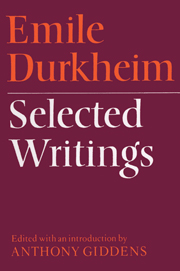Book contents
- Frontmatter
- Contents
- Preface
- Abbreviations
- Introduction: Durkheim's writings in sociology and social philosophy
- 1 The field of sociology
- 2 Methods of explanation and analysis
- 3 The science of morality
- 4 Moral obligation, duty and freedom
- 5 Forms of social solidarity
- 6 The division of labour and social differentiation
- 7 Analysis of socialist doctrines
- 8 Anomie and the moral structure of industry
- 9 Political sociology
- 10 The social bases of education
- 11 Religion and ritual
- 12 Secularisation and rationality
- 13 Sociology of knowledge
- Index
7 - Analysis of socialist doctrines
Published online by Cambridge University Press: 05 August 2012
- Frontmatter
- Contents
- Preface
- Abbreviations
- Introduction: Durkheim's writings in sociology and social philosophy
- 1 The field of sociology
- 2 Methods of explanation and analysis
- 3 The science of morality
- 4 Moral obligation, duty and freedom
- 5 Forms of social solidarity
- 6 The division of labour and social differentiation
- 7 Analysis of socialist doctrines
- 8 Anomie and the moral structure of industry
- 9 Political sociology
- 10 The social bases of education
- 11 Religion and ritual
- 12 Secularisation and rationality
- 13 Sociology of knowledge
- Index
Summary
THE STUDY OF SOCIALISM
We can conceive of two very different ways of studying socialism. We can see it as a scientific doctrine on the nature and evolution of societies in general and, more specifically, of the most advanced contemporary societies. In this case, the analysis which we make does not differ from that to which scholars submit the theories and hypotheses of their respective sciences. It is considered abstractly, outside of time, space, and future history, not as a fact the origins of which we seek to discover, but as a system of propositions which express or are deemed to express reality; we then ask what is its truth or falsity, whether or not it corresponds to social reality, in what measure it is self-consistent, and conforms to things as they are…This will not be our point of view. The reason for this is that without diminishing in any way the importance of our interest in socialism, we cannot accord it a fully scientific character. In fact, ‘research’ only deserves to be called by that name if it has a definite and real subject-matter, which it simply aims to translate into intelligible language. Science is a study bearing on a delimited portion of reality which it aims at knowing and, if possible, understanding. To describe and explain what is and what has been – this is its sole task. Speculation about the future is not its concern, although it may ultimately seek to make this possible.
- Type
- Chapter
- Information
- Emile Durkheim: Selected Writings , pp. 155 - 172Publisher: Cambridge University PressPrint publication year: 1972



